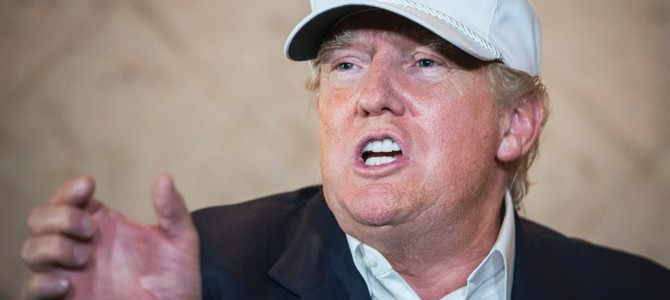
Donald Trump will be the Republican nominee for president, and the rest of the Republican Party can either find a way to unite around his candidacy, or doom themselves and Trump to defeat by Democrats, led by Hillary Clinton.
A Clinton victory would be a catastrophe. It would damage everything that Republicans and conservatives care about, especially including Clinton appointments to the Supreme Court. It is imperative that Republicans, conservatives, and others who love America unite to prevent the Clintons from regaining the White House.
There will continue to be genuine and significant policy differences between Trump, his supporters, and many other Republicans. Nonetheless, Trump’s candidacy filled stadiums with cheering supporters, many of whom are new voters. These energized voters put states into play that would otherwise be beyond hope of voting for the Republican nominee in November. The movement Trump has created should be a source of strength for the GOP going into the national election in November. This enthusiasm and energy is a momentous opportunity for the GOP, and it must not be wasted.
Lots of Republicans Agree with Trump’s Major Ideas
Achieving a much higher degree of party unity should be less difficult than many imagine. Much of the opposition to Trump is a matter of style, including his blunt and forceful language, his indifference to decorum, and his pugnacious and confrontational tone. But the actual substantive differences between Trump and most Republican voters, even many who opposed him, can be overcome.
Trump’s speeches have focused on trade, immigration, and border security, emphasizing policies that were not even within the Republican mainstream less than a year ago. Nonetheless, Trump’s signature issues can be incorporated in a GOP platform in a way that permits a party unity and an election victory in November.
An under-emphasized aspect of Trump’s run has been the genuinely conservative, and mainstream Republican nature of many of his published proposals. These policies are embodied mainly in the six policy proposals published on his website, and his two campaign books “Crippled America: How to Make America Great Again” (2015) and “Time to Get Tough: Make America Great Again!” (updated edition, 2015), as well as his AIPAC speech and his foreign policy speech at the Mayflower Hotel. Each of these merits careful review.
These Trump policies provide the basis for a unifying platform that will reassure most Republicans and conservatives Trump is not a covert progressive, as many of them fear, while assuring his supporters that their candidate will be able to put his policies into place, and that the GOP will “let Trump be Trump.”
A Republican “Make America Great Again” platform would include a commitment by a GOP majority Congress to pass certain legislation in the first 100 days of the next presidential term. Trump, as president, would commit to signing each such item of legislation into law. These commitments and this platform will provide a clear and dramatic program of action for the new president and for the 114th Congress, and a unifying agenda for all Republican candidates.
Here’s the Make America Great Again Platform
The “Make America Great Again” Platform could include the following proposed legislation:
- Repeal Obamacare in its entirety.
- Enact legislation that creates a national health insurance market.
- Expand health savings accounts.
- Mandate price transparency in health care and medication.
- De-fund Planned Parenthood so long as it performs abortions.
- Prohibit federal funding for or review of state curriculum mandates and tests, which helped nationalize Common Core.
- Authorize funding for a border wall, including provisions for alternative funding, such as levies against remittances to Mexico.
- Triple the number of Immigration and Customs Enforcement officers.
- Mandate nationwide E-verify.
- De-fund sanctuary cities.
- Raise the prevailing wage paid to H-1Bs to make U.S. citizens competitive.
- Increase standards for admitting refugees and asylum-seekers, including stronger background checks.
- Pause in issuing green cards until U.S. citizen unemployment improves.
- End birthright citizenship, i.e. no more “anchor babies.”
- Allow veterans to use Department of Veterans Affairs (VA) benefits to purchase private health care from any doctor or care facility that accepts Medicare.
- Increase funding for VA treatment of post-traumatic stress disorder.
- Increase VA funding for job training and placement services for veterans
- Fund OB/GYN services at all VA hospitals.
- Simplify the tax code consistent with Trump’s proposals.
- Eliminate all income taxes on singles making $25,000 or less, and on all married couples making $50,000 or less.
- Enact legislation for a one-time repatriation of corporate cash held overseas, with repatriated funds to be taxed at 10 percent and no other penalty.
- Enact a 15 percent maximum business tax, for corporate tax as well as small businesses and freelancers.
- Eliminate the death tax.
- Enforce the Second Amendment by ending gun and magazine bans.
- Enforce the Second Amendment by requiring states to put criminal and mental health records onto background check system.
- Enforce the Second Amendment by enacting a national right-to-carry law, with permits to be valid in all 50 states.
- Authorize the Keystone Pipeline.
- Provide for an initial round of funding for new infrastructure construction and repair.
Each of the foregoing items is derived from Trump’s published positions. There are numerous others that could be added. Each of these policy proposals is well within the Republican and conservative mainstream. As a group, these platform “planks” will satisfy a variety of important Republican constituencies. Most Republicans nationwide will be able to support most of the items in this platform, and many independents and some Democrats may find some of these items appealing as well.
Various other items would be impossible to enact in the first 100 days, but should still be referenced in the platform. For example, defense procurement reform, longer-term infrastructure construction and repair, and reforming the Environmental Protection Agency may all require a longer period of investigation, hearings, and drafting of legislation. Nonetheless, platform planks regarding each of these items could be drafted.
That’s Not All, Folks
Perhaps the most critical unifying element will be appointing a highly qualified, conservative Supreme Court associate justice who will be a worthy successor to the late, great Justice Antonin Scalia. Trump has stated repeatedly that he plans to appoint a strong conservative justice, even naming well-qualified potential nominees. A strong commitment to consult with Republican senators and nominate an outstanding successor to Justice Scalia will go a long way toward unifying the party, and should be referenced in the platform.
One of Trump’s signature campaign issues has been negotiating better deals with America’s foreign trading partners. This has provoked concern among many Republicans who are committed to free trade. The platform could recognize both viewpoints. It would recognize that trade agreements fall largely within the president’s executive authority. The various superior deals for the U.S.A. that Trump proposes to make will, in any case, not be ripe for legislation in the first 100 days, and possibly not even in the first year of his presidency.
Trump brings a unique approach and mindset to these issues. If he is nominated and elected, he will have a mandate to try to execute on these promises on behalf of the American people. The platform need only say Trump has promised to obtain better trade deals for the American people, and he will undertake to negotiate such deals.
The issue of trade highlights an important lesson from the movement that supports Trump. It is an under-appreciated fact that even policies that increase aggregate wealth, such as open trade, have winners and losers. The American people and their government must pay more attention to the costs of these policies, and do more to help the people who bear the brunt of the “creative destruction” from open foreign trade, however beneficial it may be overall.
This is a moral as well as a political necessity. We must mitigate these costs if we are to preserve in the future the enormous benefits of free trade, for America and the world. Some recognition of this important fact would help bring Trump and the mainstream GOP closer together.
Many millions of Americans hope to see a unified Republican Party win a great victory in November 2016, enact a substantial reform program, and set us on a path toward making American great again. This is possible with good will and a cooperative spirit on all sides.
The recent meeting between Trump and Ryan should be merely a first step toward a unified party and an election victory.









